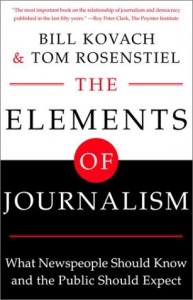 For my J800 class I was assigned to read Bill Kovach and Tom Rosenstiel’s The Elements of Journalism – What Newspeople Should Know and the Public Should Expect. I finished it in two days, it was a quick read, but an important one. Just in these first few days of classes, I’ve been reminded how important it is for the public to build a relationship with a journalist based on transparency and verification of information. If no one trusts what you say, you can’t be a journalist. Its that simple.
For my J800 class I was assigned to read Bill Kovach and Tom Rosenstiel’s The Elements of Journalism – What Newspeople Should Know and the Public Should Expect. I finished it in two days, it was a quick read, but an important one. Just in these first few days of classes, I’ve been reminded how important it is for the public to build a relationship with a journalist based on transparency and verification of information. If no one trusts what you say, you can’t be a journalist. Its that simple.
So what are the “Elements of Journalism?”
(Taken directly out of the book)
1. The primary purpose of journalism is to provide citizens with the information they need to be free and self-governing.
2. Journalism’s first obligation is to the truth.
3. Journalism’s first loyalty is to citizens.
4. The essence of journalism is a discipline of verification.
5. Journalists must maintain an independence from those they cover.
6. Journalists must serve as an independent monitor of power.
7. Journalism must provide a forum for public criticism and compromise.
8. Journalists must make the significant interesting and relevant.
9. Journalists should keep the news comprehensive and in proportion.
10. Journalists have an obligation to exercise their personal conscience.
Things to think about as I start to settle into my chosen profession…